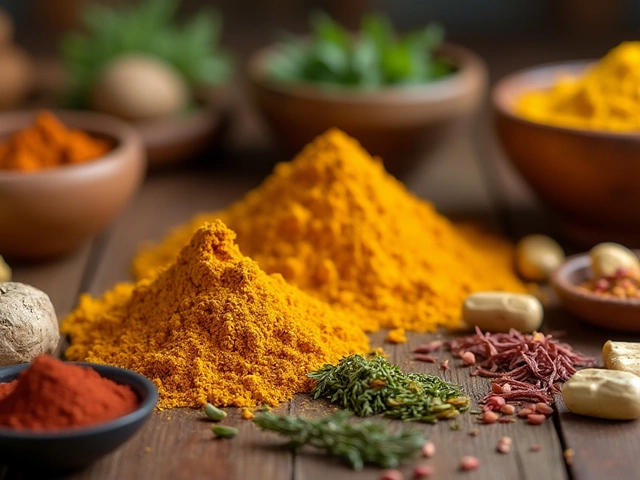- Home
- Herbal Medicine
- Herbal Supplements: Is Taking Too Many Bad for You?

Herbal Supplements: Is Taking Too Many Bad for You?
Ever lined up all your herbal supplements on the kitchen counter and thought you were nailing your health game? It's easy to believe that if one is good, five might be even better. But when it comes to herbs, more isn't always merrier—and taking a handful every day can actually backfire.
People tend to assume these supplements are totally safe just because they're 'natural'. But that doesn’t mean they’re risk-free. Some herbs can mess with your stomach, make you feel jittery, or even clash with meds you’re already taking. Back in 2023, a news story went viral about a guy who stacked a bunch of immune-boosting herbs during flu season and ended up in the ER with a racing heart and wild blood pressure swings. That stuff isn’t rare.
This isn’t about fear-mongering—it’s about being realistic. Knowing what’s in your herbal bottles, how much you actually need, and whether it’s safe to mix them gives you way more control over your health. Why play supplement roulette when you can make smarter choices up front?
So, if the thought "Could this stuff actually backfire?" ever pops into your head, you’re already on the right track. Let’s break down what happens when herbal supplements go from helpful to harmful, and how you can sidestep the biggest mistakes people make.
- Why People Rely on Herbal Supplements
- Can Too Many Supplements Hurt You?
- Common Side Effects Nobody Talks About
- Staying Safe: Smarter Ways to Use Herbal Supplements
Why People Rely on Herbal Supplements
Walk into any pharmacy, supermarket, or even a gas station and you'll spot entire shelves packed with herbal supplements. It's not just clever marketing—loads of people actually use these daily. The big draw? Many folks are looking for a more “natural” way to tackle their health issues, whether that’s beating stress, sleeping better, or giving their immune systems a kick.
According to a 2024 survey by the National Center for Health Statistics, about 62% of adults in the U.S. have tried a herbal supplement in the past year. That’s a jump from just 43% a decade ago. People seem to trust herbs more than regular meds for everyday stuff like sleep, energy, and digestion. Plus, a fair number hope herbs come with less side effects than pharmaceuticals.
Some of the top reasons people turn to herbal supplements include:
- Wanting more energy (think ginseng and maca root)
- Hoping to reduce stress or anxiety (like ashwagandha or valerian)
- Trying to boost immunity (elderberry and echinacea are classics)
- Looking for gut support (like ginger or peppermint)
- Getting help with sleep (such as melatonin and chamomile)
Prices also make a big difference. Herbal supplements don’t always cost as much as prescription drugs. Some folks like the idea of being in control, self-treating minor issues without seeing a doctor first.
Here's a quick look at how popular certain herbal supplements are in 2024, based on retail sales in the U.S.:
| Herbal Supplement | Main Use | 2024 Sales ($ Millions) |
|---|---|---|
| Elderberry | Immunity | 334 |
| Ashwagandha | Stress/Anxiety | 210 |
| Turmeric | Inflammation | 194 |
| Ginger | Digestive Health | 122 |
| Melatonin | Sleep | 278 |
Bottom line: Most people don’t reach for herbal supplements just for the heck of it. There’s usually a mix of curiosity, past results, or suggestions from friends behind it. And because they’re often labeled “safe” or “all-natural,” it’s easy to forget that using a bunch at the same time could still cause problems, especially if you ignore dosing or mix them up with your regular meds.
That’s why it’s smart to stay skeptical and check the details before jumping on the supplement bandwagon. A little research goes a long way—especially when it comes to herbal supplements.
Can Too Many Supplements Hurt You?
Here’s the truth: piling on herbal supplements can hurt you. Your body only needs so much of anything—even natural stuff. Taking big doses or layering similar herbs piles on the risks. Some herbs act almost like drugs, so it's not just harmless tea and positive vibes in a capsule.
For example, too much ginseng can cause headaches, sleep problems, and high blood pressure. Loading up on licorice root can drain your potassium and send your blood pressure through the roof. St. John’s Wort interacts with antidepressants and birth control, sometimes making those meds useless. These cases pop up in real doctor's offices every year—not just some weird fluke.
If you think the risks only pop up with super-high doses, that’s not true either. Some herbs build up in your system, even at the “right” amount, if you take them for months on end. Others can mix in ways nobody predicted because supplement makers don’t always check how their stuff interacts together. Ever try mixing valerian (for sleep) and kava (for relaxation)? For some people, that combo can wreck your liver.
- The FDA doesn’t test most supplements for safety or purity, so you can’t always trust what’s inside.
- The label might say “natural,” but that doesn’t mean it’s gentle on your body.
- Popping multiple products with the same ingredient can quickly tip you into unsafe territory—most folks don’t realize when they’re doubling up.
So, yes, too much can absolutely backfire. The safest move? Don't assume natural equals harmless. Check what you’re actually taking and talk to your doctor, especially if you’re on prescription meds or have health conditions. Smart choices now beat regrets later.

Common Side Effects Nobody Talks About
People love to talk about the supposed benefits of herbal supplements, but you hardly hear about the stuff that goes wrong. Sure, most labels warn about “possible side effects,” but they usually sound rare or harmless. Truth is, weird stuff happens more often than you think.
Let’s get specific. Turmeric is everywhere—for joints, inflammation, you name it. But, taking too much can give you an upset stomach or even thin your blood more than you’d expect, especially if you’re on aspirin. St. John’s Wort is a mood favorite, but it can jack up your sensitivity to the sun, so you burn faster. That’s not just annoying—it can be dangerous if you’re outside a lot and have no clue.
Here are side effects that catch people off guard:
- Liver problems: Kava, green tea extract, and black cohosh can stress your liver. There were over 500 reported cases of liver injury linked to supplements in the past two years in the US alone.
- Messed-up sleep: Ginseng or guarana can make people wired, causing insomnia and even heart palpitations if you double up on doses.
- Blood pressure swings: Licorice root can push your blood pressure up, and hawthorn can send it the other way. Not fun if you already have heart issues.
- Weird mood changes: Valerian is supposed to help you chill out, but too much might make you groggy and confused. St. John’s Wort can sometimes trigger anxiety or headaches.
- Gut disasters: Aloe vera supplements, when overdone, cause diarrhea—which, apart from being uncomfortable, can mess up your electrolyte balance.
Check this out for a reality check:
| Herbal Supplement | Potential Side Effect | Reported Cases (2024) |
|---|---|---|
| Turmeric | Stomach Upset, Blood Thinning | 314 |
| Green Tea Extract | Liver Issues | 125 |
| St. John’s Wort | Photo-sensitivity, Mood Swings | 212 |
| Ginseng | Insomnia, Heart Palpitations | 158 |
Most people don’t expect their "natural" capsules and powders to have these kinds of side effects, but the risks are real. If you start feeling off—like getting rashes, can’t sleep, or your stomach’s rebelling after adding something new—don’t just power through. It’s worth taking a break and talking to someone who knows their stuff. And always check the label; one person’s energy booster could be another’s ER visit.
Staying Safe: Smarter Ways to Use Herbal Supplements
If you’re set on using herbal supplements, you need a simple playbook. Most bad reactions happen when people skip the basics: mixing too many at once, ignoring legit dosing info, or trusting sketchy brands. Here’s how to keep things safe and actually effective.
- Start slow. Only add one new supplement at a time. That way, if you get a weird reaction, you’ll know what caused it.
- Read the label. Look for third-party testing marks like NSF or USP. These show someone’s checked the bottle for fake fillers or bad ingredients.
- Avoid megadoses. Stick to the recommended amount. More isn’t safer, and high doses can mess up your liver or kidneys.
- Check for interactions. If you’re on meds—blood thinners, heart drugs, or antidepressants—ask a pharmacist before adding anything new. Popular herbs like St. John’s wort can make birth control or anxiety meds stop working.
- Share your list with your doctor. Don’t keep your supplement stash a secret. It makes their job easier if something goes sideways.
If you want to see how these risks and safety tips stack up, check out this quick table based on real-world research from the National Institutes of Health and recent hospital stats:
| Supplement | Common Issue When Overused | Notable Interactions |
|---|---|---|
| St. John’s Wort | Mood swings, stomach upset | Antidepressants, birth control pills |
| Ginkgo Biloba | Bleeding, headaches | Blood thinners (warfarin, aspirin) |
| Echinacea | Allergic reactions, liver strain | Immunosuppressive drugs |
| Turmeric | Upset stomach, kidney stones | Diabetes meds, blood thinners |
Stick to well-known brands, double-check the dose, and don’t fall for wild health claims. If a supplement promises an overnight miracle, it’s probably more hype than help. Smarter choices now mean less drama later. Your body—and honestly, your wallet—will thank you.

Arnav Singh
I am a health expert with a focus on medicine-related topics in India. My work involves researching and writing articles that aim to inform and educate readers about health and wellness practices. I enjoy exploring the intersections of traditional and modern medicine and how they impact healthcare in the Indian context. Writing for various health magazines and platforms allows me to share my insights with a wider audience.
About
Medical Resource Center India is a comprehensive online platform dedicated to providing reliable health information and medical resources in India. Explore a wide range of articles, tips, and advice on medicine, healthcare services, and wellness. Stay informed about the latest developments in Indian medicine and access valuable insights into maintaining a healthy lifestyle. Discover expert guidance and health solutions tailored for every Indian citizen. Your go-to destination for authoritative medical knowledge in India.








